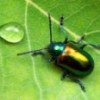This week, Public Radio International is hosting a forum whereby you- the fine people of the General Public- get a chance to converse online with eminent entomologist May Berenbaum about all things DDT.
The forum accompanies a piece from last week's "The World". For background, you can read Berenbaum's recent Washington Post essay about the DDT-malaria problem here:
What people aren't remembering about the history of DDT is that, in many places, it failed to eradicate malaria not because of environmentalist restrictions on its use but because it simply stopped working. Insects have a phenomenal capacity to adapt to new poisons; anything that kills a large proportion of a population ends up changing the insects' genetic composition so as to favor those few individuals that manage to survive due to random mutation. In the continued presence of the insecticide, susceptible populations can be rapidly replaced by resistant ones. Though widespread use of DDT didn't begin until WWII, there were resistant houseflies in Europe by 1947, and by 1949, DDT-resistant mosquitoes were documented on two continents.

